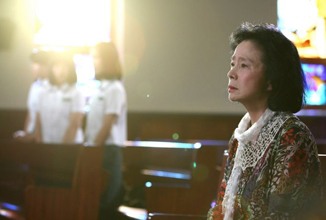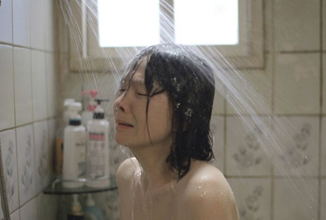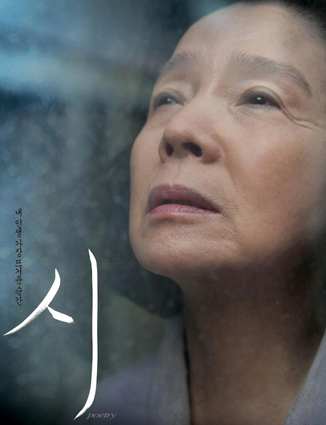"How is it over there? How lonely is it? Is it still glowing red at sunset?
Can you receive the letter I dared not send? Can I convey the confession I dared not make?"
Synopsis:
Yang Mija (Yoon Jung-hee) is a sixty-six year-old lady who looks after her selfish and disrespectful grandson, Wook (Lee David), while barely surviving on government hand-outs and from working part-time as a carer for elderly stroke victim Elder Kang (Kim Hee-ra).
A minor ailment causes her to seek medical advice and inadvertently leads to the discovery that she is suffering from the early stages of Alzheimer's disease.
Desperately trying to find some semblance of meaning in her life, and with a growing subconscious need to express herself before the beautiful memories of her past are taken from her, she enrolls in a poetry course at the local Cultural Centre, but, try as she might, the inspiration she needs to compose her first poem continually seems to elude her.
However, the discovery of the body of a young schoolgirl (who committed suicide) in a nearby river impacts on Mija's life in a way she could never have imagined and, as she is forced by others to make amends for a tragedy which was not of her making, she finds the inspiration she seeks waiting for her in an utterly unexpected place...
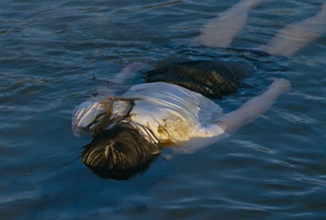 |
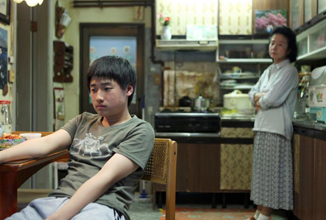 |
Review:
Life is rarely a simple or straightforward affair. As we search for, or try to hold on to, our place in the world, attempting to find moments of happiness, contentment and beauty in our lives and surroundings, events all too often occur which bring with them a truth that threatens to turn peace into chaos, pleasure into pain and love into distrust. Even the beloved memories we cherish the most invariably become tinged with sadness as time marches inevitably on - be it from a yearning for better times long gone; from feelings of loss caused by the passing of a loved one; or from the bitter twist so often laced within hindsight.
So, what are we to do? Shut down our emotions? Close ourselves off and accept a cold, dark, ultimately bleak and meaningless existence, ignoring our feelings and beliefs of right and wrong along the way? Or do we continue to search for beauty and truth in life, focusing our efforts in a different place and trying to view events from a fresh perspective?
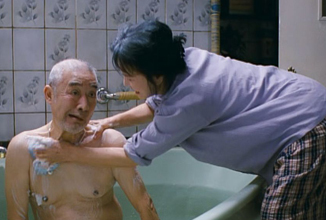 |
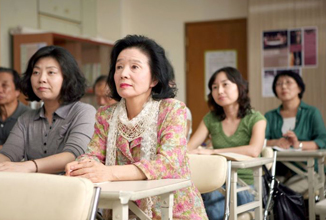 |
Such is the dilemma facing Mija on learning that she has Alzheimer’s disease, drawing her almost inextricably to a sign advertising a poetry writing course at the local Cultural Centre, and bringing memories to her mind of her daughter's comments that Mija "always had a poet's vein".
The subsequent discovery of the truth behind the young schoolgirl’s suicide compounds her dilemma still further, and though her poetry course begins simply as a welcome distraction from the ever increasing problems in her life, it soon becomes part and parcel of her focus to right the wrongs which surround her.
Others' perceptions of Mija are clearly important to her. She dresses 'to the nines', is always polite, and generally tries to be agreeable even when her opinions are at odds with what others say or choose to do, keeping her thoughts largely to herself. But while her perceptions of others are, initially, seemingly set in stone, being forced to look at the world from a different point of view (in the search for poetic inspiration) ultimately cascades through her life, affecting her entire outlook and shaping her eventual choices to a massive degree.
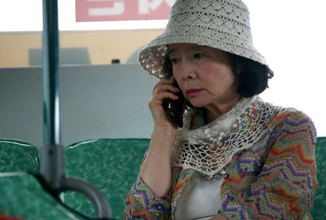 |
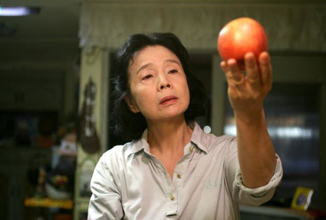 |
Poetry succeeds on every conceivable level.
Sumptuous and arresting visuals combine with a perfectly nuanced, understated narrative to almost guarantee that viewers will have not only their minds engaged but also their hearts touched.
The story moves at a gentle pace but never feels drawn out, forced or laboured, and not a single scene lasts a second longer than required nor a moment less than necessary. Even the largest plot points occur in an almost passing fashion with the importance of each only coming to light as the narrative gradually unfolds. No matter how large or small Mija's interactions with others appear to be, each is vital to proceedings, and while nothing is overtly explained in Poetry, nothing needs to be - events and the ensuing implications being conveyed so expertly, yet quietly, as to be blatantly and heart-wrenchingly clear.
Though there are some fairly dark elements to Poetry, it is nonetheless uplifting to an extent seen in all too few films, and the beauty and poignancy it contains remain long after the credits roll.
Repeated visual and narrative references to a babbling river throughout Poetry provide physical and mental imagery which, quite frankly, sum up the film to a tee: An ever flowing story of a life through which events cause ripples in what would otherwise be the calm sunset of living. While those rippling waves barely seems to disturb the surface, they each run deep nonetheless and, whether large or small, all have their part to play in the shaping of the person Mija is, who she becomes, and the choices she ultimately makes.
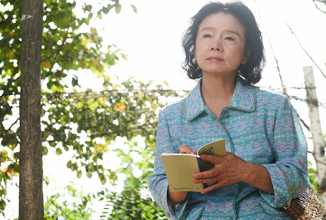 |
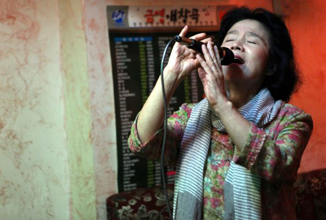 |
Cast:
Yoon Jung-hee's portrayal of Mija is utterly exemplary. She owns every scene in which she appears (which is almost every scene) effortlessly, and her performance routinely raises the level of an already astounding script to an almost unprecedented degree.
However, even though the majority of the other roles in Poetry are supporting parts, their importance should not be underestimated, and thankfully each and every cast member steps up to the mark with ease, thereby providing the perfect counterpoints to Mija's character, that the narrative requires.
One final point of note is the casting of real-life poet Kim Yong-tak as himself in the role of the poetry teacher – a nice touch which adds yet further to the realism of the story.
Cast: Yoon Jung-hee, Lee David, Kim Hee-ra, Kim Yong-taek, Park Myeong-sin
Summary:
Poetry is the story of one woman's search for meaning, beauty and expression in a life peppered with pain and long lost dreams, and by the time the credits roll, viewers will be in no doubt that they have witnessed an utterly unforgettable, gentle yet gripping and poetic story which is equally as uplifting as it is poignant. In short, life is Poetry.
DVD
The DVD
edition reviewed here is the Korean (Region 3) United Entertainment Korea Special Edition 2-Disc release. The film itself is
provided as an anamorphic transfer with an aspect ratio of 1.85:1 and there are no image artifacts (and no ghosting) present. Not only does the
picture remains consistently sharp and beautifully rich, with great depth of field throughout, but colours are truly sumptuous, giving full justice to the film's incredible cinematography.
The original Korean
language soundtrack is provided as a choice of Dolby Digital 5.1 and Dolby Digital 2.0 and both are clear and well balanced.
Excellent subtitles are provided
throughout the main feature but English-speaking viewers should note that, as with many Korean DVD releases, there are no subtitles available on any of the extras.
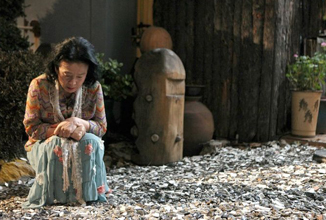 |
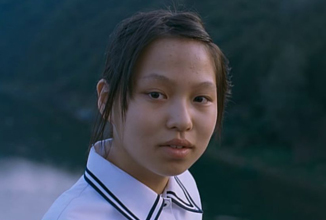 |
DVD
Details:
• Director: Lee Chang-dong
• Format: NTSC,
Anamorphic, Widescreen, Subtitled
• Language: Korean
•
Subtitles: English/Korean/None
•
Sound: Dolby Digital 5.1, Dolby Digital 2.0
• Region: Region 3
• Aspect Ratio:
1.85:1
• Number of discs: 2
• Classification: 15 (Korean Film Classification)
• Studio:
United Entertainment Korea
• Run Time: 139 minutes (approx.)
DVD Extras:
- Audio commentary
- Making Of Featurette
- Promotional Video
- Theatrical Trailer
|










